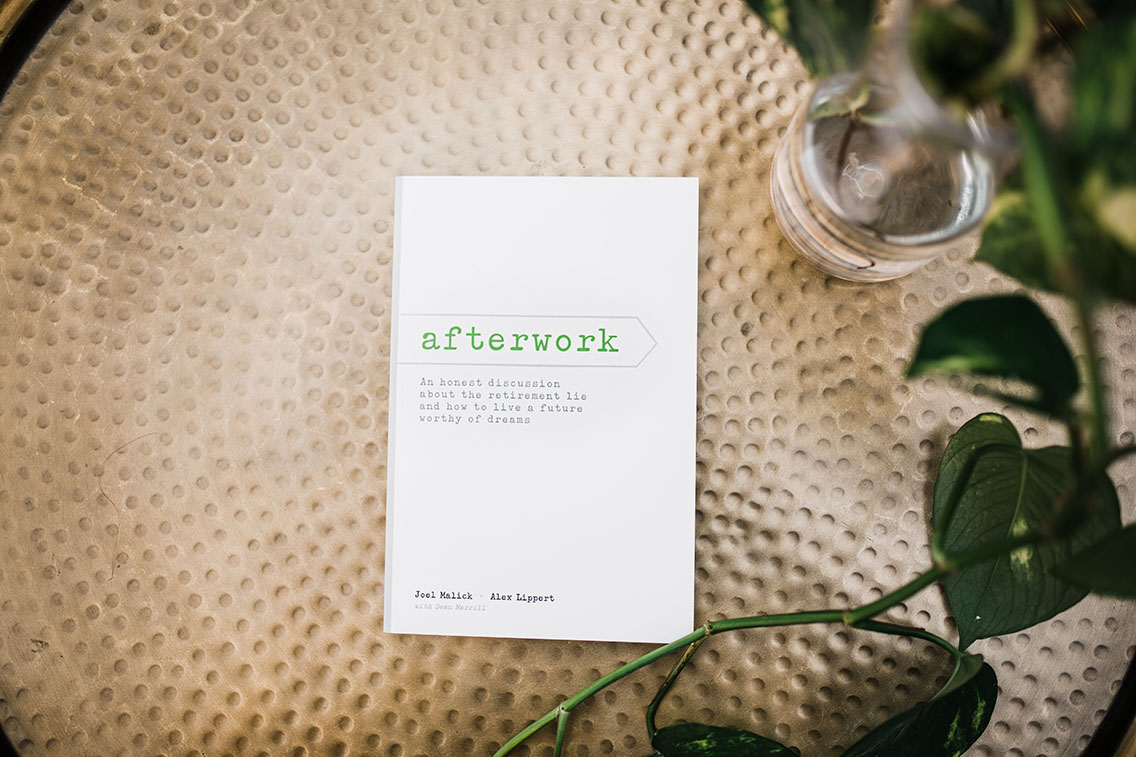…and how to live a future worthy of dreams.
Joel Malick and Alex Lippert, Partners at Steadfast Wealth Co. in Colorado Springs and serving Alliance workers all over the globe, recently released their book: afterwork: An honest discussion about the retirement lie and how to live a future worthy of dreams. The Steadfast team serves as advisors to the Alliance 403(b) plan, and we are incredibly blessed to offer their consultative services for free to our participants.
One of my most memorable experiences at Alliance Council 2019 in Orlando, FL, was sitting in the front row of Joel’s retirement seminar as he addressed a packed conference room. I was excited to hear his presentation because he told me that this particular seminar would be incredibly different than any he had done before. It wouldn’t include anything about financial planning, investments, tax strategy, or any information of a technical nature. Instead, he was going to talk about something the Lord had laid on his heart after helping so many clients (many of them Alliance workers) transition into retirement. I sat in amazement as Joel began to share his past experiences with retirees who have done it right… and those who have done it wrong. The subject matter was so simple yet so thought-provoking and impactful. I knew Joel and his team were not finished spreading this important message.
Fast forward to later that summer, as I was having lunch with Joel, Alex, and the rest of the Steadfast team at a local restaurant in Colorado Springs. We had just finished watching the morning session simulcast of the Global Leadership Summit, held every summer in Chicago, and we chatted about what we had heard and seen that morning as we waited for our food. As we were talking, I brought up the Council seminar again. I just couldn’t get over the impact it made on our people. That’s when Joel told me that he and Alex were writing this book and wanted to get this message into the hands of as many people as possible. I was, of course, thrilled to hear of their plans and purchased one on the day it was released earlier this year. I can confidently tell you that the book is just as impactful as that seminar was two years ago.
In the paragraphs below, Joel and Alex talk about their book, why they wrote it, and the effect its already having on people. I would certainly encourage anyone to pick up a copy regardless of where they are in their work or retirement journey. You can find links to do so at the end of the article.
Why did you write afterwork, and what is your objective?
We both felt called to write this book after seeing firsthand how many people can struggle in retirement. It’s such an unfamiliar concept that one may not end up loving retirement. The narrative that society feeds all of us constantly is that as long as you reach a certain financial level, no longer needing to earn income to cover living expenses, you can sail off into the sunset and essentially enjoy an endless vacation. This isn’t the reality. Personally and professionally, we both had this deep desire to understand why so many people end up retiring and finding some level of emptiness instead of the blissful freedom that they dreamed about for decades. Through that process, we realized how much perspective was missing from the retirement planning picture and more broadly as we all look out at the horizon and plan our futures.
The tenets that afterwork explores aren’t even an afterthought within the financial services realm because it’s quite frankly not profitable to spend any time with clients on “purpose” or “fulfillment”. While we believe in financial planning, it’s our opinion that the intangible parts presented in the book are the most impactful aspects of future success; money is not. In the end, you can have all the money in the world and be miserable without a purposeful existence, but you don’t need money to thrive and lead a fulfilling life.
By writing this book, we hope to positively impact people’s futures and change the narrative of the often bleak finance industry. We aim to flip the script and convince people to consider the merits of focusing on disciplines. Disciplines like seeking true fulfillment and spending less time focusing on the noise that society convinces us are important, leaving us stuck in the endless busy cycle of our lives. It’s a travesty to wake up one day filled with regret, knowing deep down that so much more purposeful, good work was left undone because we were focused on the wrong things.
Interestingly, two experienced financial planners wrote a book that includes no financial planning; what gives?
The book doesn’t have any financial strategies or investing tips. It is, however, very much about your relationship with your money. Ultimately ensuring that you continue to own your financial resources and that they don’t own you is one of many parts of this complex discussion that’s critical to grasp.
We all try to control the uncontrollable daily:
- Checking our account balances too often as the market goes on its roller-coaster ride.
- Reacting to the daily news cycle.
- Turning our instant gratification wheels on social media.
These things can waste limited bandwidth instead of pushing us towards being better than we were yesterday and, in the process, improving those around us and the world in general. Being intentional about where your daily focus lies keeps us constantly on track, as it’s easier than ever to be derailed by all the noise out there that leads us to pursue happiness instead of purpose. Happiness is a byproduct of purpose. If you follow things you think will make you happy, it can often be the wrong pursuit. If you pursue fulfillment, through that process, happiness will naturally occur.
Planning and being as good of stewards as possible over our resources is essential, but what’s the point of having financial resources if they aren’t creating the flexibility for you to pursue your unique life purpose and mission to make a real impact?
What is the retirement lie that is referenced in the book’s subtitle?
If you grab a thesaurus off the shelf and find the word “retire,” you’ll find plenty of words that sound terrible: retreat, withdraw, adjourn, depart. Who wants to do that?! Retirement is graduation to a new exciting season of impact and growth. But like any graduation, it’s a transition towards something new that encapsulates challenges and requires real effort.
The retirement lie is the idea that a self-centric, withdrawn retirement is a good one. When one is ready for that next season of retirement, at that point in your life, you have accumulated the most experience, wisdom, financial resources (presumably). You will have the most time that you have ever had. It’s time to put those powerful attributes to work and lean in. Do the opposite of retirement. All of the fun stuff that the average American thinks encapsulates retirement: traveling, home projects, more social time with friends, etc., aren’t negative things in and of themselves and should be enjoyed, but things of that nature can’t be your life thesis looking forward. From our experience, Alliance folks are more likely to be attuned to this reality than the average American. In our interactions with missionaries, pastors, and home office employees over the years, we have heard questions like: how can I pursue a new ministry in retirement? Or how can I deepen my faith in this new season of life? These are obviously on the right path – we hope our message helps cultivate those types of mentalities and helps to reaffirm them within the faith context and elsewhere in our everyday lives.
What are some major takeaways you’d like to share from your experiences helping people plan for, retire, and live well in retirement?
One’s relationship with time changes drastically in the latter 1/3 of life. There’s always a shortage of time during the busy seasons of life (demanding career, raising children, etc.). We all are busy. Just go to a BBQ and ask someone how they are, and their reply will almost certainly be some form of “busyness”. It’s remarkably true – unfortunately. Sometimes we mistake busyness for purpose. If you are juggling so many important things, it can be challenging to stop and ask yourself: “is what I’m doing daily fulfilling”? This is as important for someone’s pre-retirement as it is post-retirement. Sometimes folks can fill their calendar to the brim to “stay busy” because they have so much time on their hands. So, mistaking busyness for purpose is a crucial distinction to ponder. When you do retire, your “free time” doubles, and you’ll have a lot of freedom to choose how you spend that time. It’s immense freedom but also an exciting responsibility to be the conductor of your orchestra. Know this going into that season, so your eyes are wide open. Time can quickly become an enemy if one’s not intentionally preparing for having a lot of it.
Another central theme throughout the book is that discomfort creates real comfort and that effort produces real results. We all need to feel accomplished and receive wins, as life can make us feel like we are losing more than winning. Retirement isn’t about putting your feet up – it’s about using your unique perspective and talents towards some meaningful purpose. If you’re being challenged in that regard, that means that when you eventually make progress or reach an intended goal, it’ll be hard-earned and worthwhile because it required real effort. The title of the book afterwork alludes to this. There is indeed work to be done after your career years. The question is will you view it as “work” or a meaningful pursuit that brings purpose to your life?
Throughout the book, you mention cornerstone habits. What are those?
Cornerstone habits are ones that, when integrated into your life, lead to improvements in other areas. They are the disciplines that address multiple areas of your quality of life simultaneously. Take journaling, for instance. When one dedicates time to consistent journaling, they become less stressed about issues they face because they have intentionally taken time to write those down, consider the situation and take a measured approach to resolve them. Less stress allows for focused time with loved ones as less of your mental bandwidth is tied up on worries. Perhaps you are journaling to leave a memorable legacy to your family, so you are accomplishing that over time too. Reviewing journal entries in the future, you’ll begin to feel more accomplished and wiser as you take a bigger-picture perspective to your life. You’ll be able to weigh previous challenges from an objective vantage point to help you navigate future ones.
Being active is similar to this. We’re intentionally avoiding the term “exercise” here as you can choose to be more active and get many benefits of exercise without all the negative connotations when referring to “working out”. Just think about how many areas of life are positively affected if you take a stationary existence and get more active. It’s remarkable how much of life is interconnected, and some powerful disciplines can supercharge those connections to one’s benefit.
Legacy is a recurrent theme throughout. Specifically, you propose the concept of reverse legacy. What is that?
Legacy is as alive as all of us are. Too many folks see legacy as something that occurs after one passes when in reality, we are cultivating our legacy during every minute of our existence. There are so many forms of legacy, and all can be hugely impactful. We examine some of those specified in the form of generosity (money, time, and selfless giving), purposeful work through volunteering, and deepening connections with others or journaling to leave context to your family and future generations.
One lens that we both constantly use in our own daily lives is that of a reverse legacy. We imagine that we are on our death beds looking back on life and ask ourselves: what do we wish we had spent more time doing? And alternatively, what would fill us with regret? This helps turn down the volume of all the distractions that derail fulfillment and helps our aim towards purpose become a bit clearer. Would you ever say: I wish I would have watched more news, or worried about the investment markets more, or stressed over things entirely out of my control. Or would you be able to say that you’re glad you spent time with your children and grandkids, or that you stayed active in life and were able to continue to do purposeful things requiring physical health, or that you dedicated yourself to your faith? It’s astonishing the level of clarity that comes from this exercise. Give this a try, and once you identify the “to-do’s” and the “to-don’ts”, don’t stop there; get to work on implementation!
What has your experience been thus far as new authors? Any fun anecdotes or experiences you would like to share?
We have enjoyed the experience as it’s serving us as a purpose-center in our own lives. About a thousand books are circulating the world currently, which is fun to think that our message may impact someone’s life, and we may never know it. We have received some powerful feedback from friends, family, clients, and even strangers.
Here are a few comments/feedback that we wanted to share:
“I found afterwork to guide me to reconsider standardly-held beliefs and relook at what I really want to achieve in the future. I will refer back to this book (and my notes in the margins!) as I look forward to what is possible.”
“I’ve been retired for almost seventeen years and this book reinforced many of the things I do in my life. But it also challenged me…I got so much out of it, that I just finished reading it for the second time.”
“I have been wondering how to go forward and it is giving me help…I was crying.”
“I wish I had read this book 20 years ago…”

afterwork: An honest discussion about the retirement lie and how to live a future worthy of dreams. For more information on the book, visit: theafterwork.net or Amazon.






